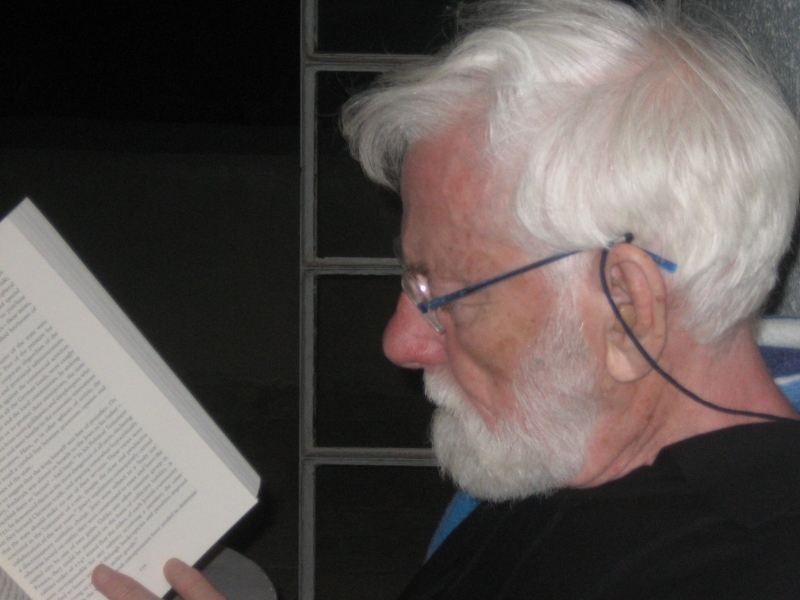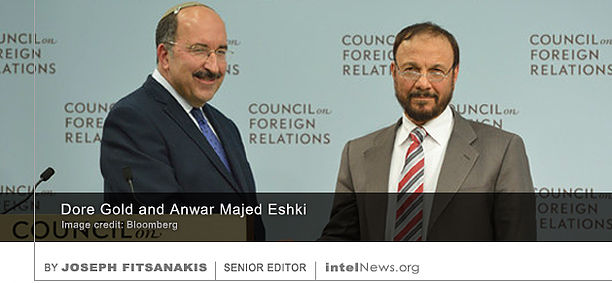www.aljazeerah.info
Opinion Editorials, April 4, 2016
Archives
Mission & Name
Conflict Terminology
Editorials
Gaza Holocaust
Gulf War
Isdood
Islam
News
News Photos
Opinion Editorials
US Foreign Policy (Dr. El-Najjar's Articles)
www.aljazeerah.info
Too Embarrassing:
Arab Countries Are Having an Affair with Israel, But Don't Want to Be Seen Together in Public
By Uri Avnery

Al-Jazeerah, CCUN, April 4, 2016
 |
 |
| Dore Gold and Anwar Eshki in a Council of Foreign Relations meeting | Retired Saudi General, Anwar Eshki |
Under the Lime Trees
ONE OF the most famous
lines in German poetry is "Don't greet me under the lime trees."
The Jewish-German poet Heinrich Heine asks his sweetheart not to embarrass
him in public by greeting him in the main street of Berlin, which is
called "Unter den Linden" ("Under the Lime Trees").
Israel is in
the position of this illicit sweetheart.
Arab countries are having an affair with her, but don't want to
be seen with her in public.
Too embarrassing.
THE MAIN Arab country in question is Saudi Arabia. For
some time now, the oil kingdom has been a secret ally of Israel, and vice
versa.
In politics, national interests often trump ideological
differences. This is so in this case.
The area referred to by
Westerners as the "Middle East" is now polarized into two camps, led
respectively by Saudi Arabia and Iran.
The northern arc consists of
Shiite Iran, present-day Iraq with its Shiite majority, the main Syrian
territory controlled by the Alawite (close to Shiite) community and Shiite
Hezbollah in Lebanon.
The Southern bloc, led by Sunni Saudi Arabia,
consists of the Sunni states of Egypt and the Gulf principalities. In a
shadowy way, they are connected with the Sunni Islamic Caliphate, a.k.a.
Daesh or Isis, which has lodged itself between Syria and Iraq. Except for
Egypt, which is as poor as a mosque mouse, they are all stinking rich with
oil.
The northern arc is supported by Russia, which just now has
given the Assad family in Syria a massive military boost. The southern bloc
has been supported until recently by the US and its allies.
THIS IS
an orderly picture, as it should be. People around the world don't like
complicated situations, especially if they make it difficult to distinguish
between friends and enemies.
Take Turkey. Turkey is a Sunnite
country, formerly secular but now ruled by a religious party. So it is
logical that it quietly supports Daesh.
Turkey also fights against the
Syrian Kurds, which fight against Daesh, and who are allied with the Kurdish
minority in Turkey, which is considered by the Turkish government as a
deadly menace.
(The Kurds are a separate people, neither Arab nor
Turkish, who are divided between Iraq, Iran, Turkey and Syria, and generally
unable to unite. They are mostly Sunnis.)
The US is fighting against
Assad's Syria, which is supported by Russia. But the US is also fighting
against Daesh, which is fighting against Assad's Syria. The Syrian Kurds are
fighting against Daesh, but also against Assad's forces. The Lebanese
Hezbollah strongly supports Syria, a traditional enemy of Lebanon, and keeps
the Assad regime alive, while fighting against Daesh, side by side with the
US, a deadly enemy of Hezbollah. Iran supports Assad and fights against
Daesh, side by side with the US, Hezbollah and the Syrian Kurds.
Can't make sense of this? You are not alone.
Recently the
US has changed its orientation. Until then, the picture was clear. The US
needed the Saudi oil, as cheaply as the King could supply it. It also hated
Iran, since the Shiite Islamists threw out the Iranian Shah of Shahs, an
American stooge. The Islamists captured the American diplomats in Tehran and
held them as hostages. To get them out, the US provided the Iranian army
with weapons, via Israel (this was called Irangate). Iran was at war with
Iraq, which was under the Sunni dictatorship of Saddam Hussein. The
Americans supported Saddam against Iran, but later invaded Iraq, hanged him
and effectively turned Iraq over to Iran, their deadly enemy.
Now
the US is having second thoughts (if all this mess has much to do with
"thoughts"). Its traditional alliance with Saudi Arabia against Iran does
not look so attractive anymore. The US dependence on Arabian oil is not so
strong as it was. Suddenly the Saudi religious tyranny does not look so much
more attractive than the Iranian religious democracy and its beckoning
market. After all, against the 20 million native Saudis there are 80 million
Iranians.
So now we have a US-Iranian agreement. Western sanctions
on Iran are being lifted. It looks like the beginning of a beautiful
friendship, threatening to leave the multitudes of Saudi princes seething
with anger and shaking with fear.
WHERE is Israel in this
mess? Well, it's a part of the mess.
When Israel was
established in the middle of a war with the Arabs, the government favored
something called "the alliance of minorities". This meant cooperation with
all the peripheral factors in the region: the Maronites in Lebanon (the
Shiites were disdained and ignored), the Alawites in Syria, the Kurds in
Iraq, the Copts in Egypt, the rulers of Iran, Ethiopia, South Sudan, Chad,
and so on.
There were indeed some loose connections with the
Maronites. The Shah's Iran became a close if half-secret ally. Israel helped
the Shah to build his secret police, and the Shah allowed Israeli officers
to pass through his territory in order to join and instruct the Kurdish
rebels in North Iraq – until, alas, the Shah made a deal with Saddam
Hussein. The Shah also became a partner in the oil pipeline that brought
Persian oil from Eilat to Ashkelon, instead of going through the Suez Canal.
(I once spent a day building that line, which is still a joint
Israel-Iranian venture, subject to arbitration.)
Now the situation
is quite different. The Shiite-Sunni divide (about the succession of the
prophet Muhammad), which has been slumbering for many generations, has come
to the fore again, serving, of course, very mundane worldly interests.
For Saudis, their competition with Iran for hegemony in the
Muslim world is vastly more important than the old fight with Israel.
Indeed, years ago the Saudis published a peace plan that resembles the plans
put forward by Israeli peace forces (including my own). It was accepted by
the Arab league but rejected by Sharon's government and then totally ignored
by successive Israeli governments.
Binyamin Netanyahu's advisers
boast that never has the geopolitical situation of Israel been better than
it is now. The Arabs are busy with their quarrels. Many Arab
countries want to strengthen their secret ties with Israel.
The ties with Egypt are not even secret. The Egyptian
military dictator openly cooperates with Israel in strangling the Gaza Strip
with its close to two million Palestinian inhabitants. The Strip is ruled by
Hamas, a movement that the Egyptian government claims is connected with its
enemy, Daesh.
Indonesia, the largest Muslim country in the world,
is close to having open relations with us. Israel's political or economic
ties with India, China and Russia are good and growing.
Tiny
Israel is considered a military giant, a technological power, a stable
democracy (at least for its Jewish citizens). Enemies like the BDS movement
are mere irritations. So what's bad?
THIS IS where we return to the
lime trees. None of our secret Arab friends want us greet them openly.
Egypt, with which we have an official peace treaty, does not welcome Israeli
tourists anymore. They are advised not to go there.
Saudi
Arabia and its allies do not want any open and formal relations with Israel.
On the contrary, they continue to speak about Israel as during the worst
stages of Arab rejectionism.
They all quote the same reason: the
oppression of the Palestinian people. They all say the same: official
relations with Israel will come only after the end of the
Israeli-Palestinian conflict. The masses of the Arab peoples everywhere are
far too emotionally involved with the plight of the Palestinians to tolerate
official connections between their rulers and Israel.
These rulers
all embrace the same conditions, which were put forward by Yasser Arafat and
included in the Saudi peace plan: a free Palestinian state side by side with
Israel, mutually agreed borders based on the June 1967 lines with minor
exchanges of territory, an "agreed" return of the refugees ("agreed" with
Israel, meaning at most a symbolic return of a very limited number).
Israeli governments have never responded to this plan. Today, under Binyamin
Netanyahu, they are further from these peace conditions than ever. Almost
every day our government enacts laws, enlarges settlements, takes measures
and makes declarations that push Israel further away from any peace that
Arab countries could accept.
FUTURE GENERATIONS will look
at this situation with wonderment.
Since the foundation of
the Zionist movement, and most certainly since the creation of the State of
Israel, Israelis have dreamt of overcoming Arab resistance and inducing the
Arab world to accept the "Jewish and democratic" State of Israel as a
legitimate member of the region.
Now this opportunity is presenting
itself. It can be done. Israel is invited to the Arab table. And Israel
ignores the opportunity.
Not because Israel is blind, but because
the occupied Palestinian territories and more settlements are more important
to them than the historic act of making peace.
That is why no one
wants us to greet them under the lime trees.
***
Share this article with your facebook friends
|
|
|
|
||
|
||||||


